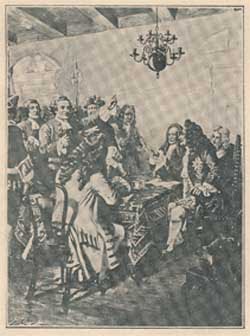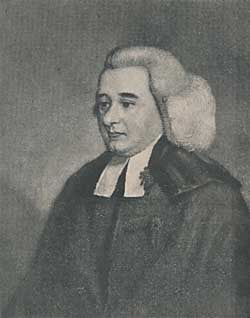This Day in Presbyterian History:
A landmark case in favor of religious freedom
[To our valued readers from the author of Thisday.pcahistory: As I read the January 21 historical devotional tonight with my wife, I realized that I had mistakenly placed down 1706 as the year that Francis McKemie and John Hampton had been arrested by the New York Anglican governor. The correct date is 1707—January 21, 1707. Please correct that error if you are keeping a print copy of the devotional for your own use. And forgive me, please.—David Myers]
 One year after the organization of the Presbytery of Philadelphia, two of the seven ministers of that Presbytery, Francis McKemie and John Hampton took a trip to New England. On their way, they stopped in New York to minister to the Reformed saints there. Requesting permission from the Deputy Governor Lord Cornbury (aka Edward Hyde) to proclaim the Word, they were shocked by his refusal to give them permission. That didn’t stop them however. A private house was secured for them, and McKemie preached “in as public a manner as possible, with open doors.” His traveling companion, Rev. John Hampton, preached in a church on Long Island. Both were arrested by Lord Cornbury on January 21, 1707, and thrown into jail. The charge was that they preached without a license. Hampton was released, but McKemie was imprisoned for six weeks. He was released by the payment of bail. Six months later, he returned for the trial. The exchanges between him and his accusers are historically important.
One year after the organization of the Presbytery of Philadelphia, two of the seven ministers of that Presbytery, Francis McKemie and John Hampton took a trip to New England. On their way, they stopped in New York to minister to the Reformed saints there. Requesting permission from the Deputy Governor Lord Cornbury (aka Edward Hyde) to proclaim the Word, they were shocked by his refusal to give them permission. That didn’t stop them however. A private house was secured for them, and McKemie preached “in as public a manner as possible, with open doors.” His traveling companion, Rev. John Hampton, preached in a church on Long Island. Both were arrested by Lord Cornbury on January 21, 1707, and thrown into jail. The charge was that they preached without a license. Hampton was released, but McKemie was imprisoned for six weeks. He was released by the payment of bail. Six months later, he returned for the trial. The exchanges between him and his accusers are historically important.
Lord Cornbury charged McKemie that he was “a strolling preacher.” Further, he declared that he was “not to spread his pernicious doctrines in New York.”
Francis McKemie answered back, “As to our doctrines, we have our (Westminster) Confession of Faith, which is known to the Christian world. I challenge all the clergy of (New) York to show us any false or pernicious doctrines therein. We can prove that its doctrinal articles agree with those of the Church of England.” The reader needs to remember that the authors of Westminster were mostly Church of England ministers!
“But you haven’t signed these articles” of the Anglican faith, Lord Cornbury countered.
McKemie answered, “I have a copy in my pocket, and am ready at all times to sign, with those exceptions in the law.”
The defense of McKemie was based on the English Toleration Law Act of 1689. Even Lord Cornbury’s attorney’s acknowledged that McKemie had such a command of English laws that they couldn’t prove him guilty. For that reason, he was acquitted, but Lord Cornbury forced him to pay the cost of the prosecution, which was several hundred dollars. This injustice was denounced by the New York legislature, who passed a law to prevent any such persecution again. Lord Cornbury was recalled the very next year back to England.
Words to Live By: Whether you preach the gospel in the pulpit as a minister, or hear the gospel proclaimed faithfully by a minister, gives thanks for the courage of Francis McKemie who stood his ground when an attempt was made to muzzle the Word of God and the testimony of Jesus Christ.
Through the Scriptures: Job 18 – 20
Through the Standards: God’s Eternal Decrees, in the Confession
WCF 3:1, 2
“God from all eternity, did, by the most wise and holy counsel of His own will, freely, and unchangeably ordain whatsoever comes to pass: yet so, as thereby neither is God the author of sin, nor is violence offered to the will of the creatures; nor is the liberty or contingency of second causes taken away, but rather established. Although God knows whatsoever may or can come to pass upon all supposed conditions, yet hath He not decreed any thing because He foresaw it as future, or as that which would come to pass upon such conditions.”


